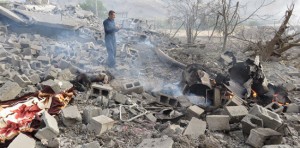An Amnesty International fact-finding mission says that multiple Turkish government airstrikes killed eight residents and injured at least eight others – including a child – in a flagrantly unlawful attack on the village of Zergele, in the Kandil Mountains in the Kurdistan Region of Iraq on August 1.
Amnesty calls on on the Turkish government to launch an independent, impartial and effective investigation into the airstrikes and to publicly release the findings of their investigation.
“The recent attacks in Kandil maimed, killed, and displaced residents, destroying homes and terrifying locals in an area where no military targets appeared to be present,” said Lama Fakih, Senior Crisis Advisor at Amnesty International who visited the area.
“The evidence of these casualties raises serious concerns about the lawfulness of the attack in Kandil, and underscores the need for any investigation into the airstrikes to be independent, impartial and to ensure accountability and reparations for victims and their families.”
Whether or not the clashes between the PKK and the Turkish government amount to a non-international armed conflict, under both the laws of war and international human rights law the killing of residents not affiliated with the PKK is unlawful.
The Turkish authorities had initially claimed the strikes were targeting PKK members at a “terrorist camp.” They have since announced plans to conduct a joint investigation into the strikes with the Kurdistan Regional Government of Iraq (KRG).
However, evidence of Amnesty International shows the killed and injured were not affiliated to the PKK. Those killed included a local mayor and two municipality workers.
Among them was Salih Mohamed Ameen, the mayor of Bokriskan, a nearby village, who was killed along with his sister, Heybet Mohamed Ameen, after he came to aid the wounded.
Amnesty International observed that approximately 10 homes were impacted in the airstrikes, including several of these homes were occupied by Peshmerga fighters and their family members. Others belonged to residents who worked in the fields.
“These [Peshmerga] fighters are not involved in the clashes between the PKK and the Turkish government but rather are fighting against the group that calls itself Islamic State (IS) in other parts of the country and would be considered civilians under international humanitarian law in the context of a Turkey-PKK conflict,” Amnesty said..
Amnesty International also found no checkpoints, police stations, or fixed military positions in the village of Zergele, confirming accounts from residents who said no PKK fighters were positioned or residing in the villages.
“The apparent absence of a military target within the vicinity of the airstrikes suggests that these strikes are unlawful whether or not there is an armed conflict between the Turkish authorities and the PKK. The Turkish government has displayed a flagrant disregard for the lives of local residents and failed to take necessary precautions to minimize harm to them, or to discriminate between them and PKK fighters,” said Lama Fakih. “These attacks should be investigated, and Turkish authorities should ensure accountability and redress in the event of wrongdoing.”



